________________
BOOK I: THE PRINCIPLE OF KNOWLEDGE
239
rising-karman (audayika-karman), are exempt from infatuation, etc.; therefore it is considered to be annihilative (kshayika).
For the Arhats the fruits of the Wishing-tree of merits are generally and completely full-ripe. Whatever action takes place in them is originated-from-rising-karman, since the self's capacities (sambhuti) are realized (sambhavita) by the experience of this rise (of karmans). Thus even action as described, taking place when the residence of the anointed king Great-Infatuation is utterly destroyed, does not acquire a causality with reference to changes in the spiritual-principle (chaitanya), because the affecting or colouring (uparanjaka) factors, namely infatuation, attachment and aversion, do not exist. So then this act, although always of an originative (audayika) nature, is at the same time annihilative, inasmuch as it is not a cause of bondage (as effect), but is a cause of liberation (as effect). For surely, if this were not accepted, then the ripening of their karmans would tend to the deterioration of their innate nature.
Now he refutes the opinion that, just as in the case of AbsoluteSages, so with anybody no deterioration of innate being takes place:
46. If the self by itself, by innate nature, were devoid of auspicious or inauspicious (good or evil) psychic dispositions, then there would be no samsara (transmigratory existence) in the case of embodied beings.
If the self absolutely does not evolve through its innate nature of good and evil states, then it abides merely in the pure innate state without deterioration, at every time, under every circumstance. And so all the multitudes of beings would enjoy eternal emancipation, because of their being devoid of all causes of bondage; for their innate nature would be free of its restless unrest." Now this is not admitted; the self, that is, having the property of its evolution, shows a good or evil nature in the same way as the crystal shows as innate nature the colour of the China rose or the Tamala flower.
Now again, in connection with the subject under discussion, he greets supra-sensorial knowledge as omniscience:
47. That knowledge which simultaneously (yugapat) knows presently existent things (and) the other objects, all in every direction, various and dissimilar as they may be, is called kshayiki (i.e. the result of the destruction of karmans).
Knowledge due-to-annihilation knows in one moment indeed both




